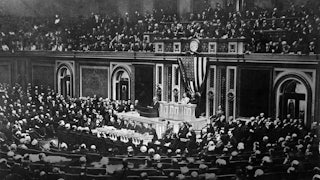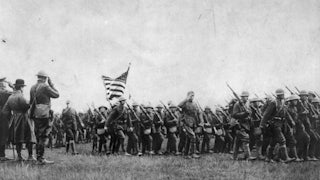Social psychologists, notably Mr. Trotter in his account of herd psychology, have described the peculiar mental effect of war upon the civilian population. Vague unlocalized anxiety and fear; dread of isolation, and desire for company to reinforce confidence and opinion; quick and easy accessibility to rumor, indeed, an eager hospitality to it; extreme credulity as to both good news and bad; a suspicious attitude which finds spies and enemies everywhere; scandalmongering of pessimistic inventions as to incompetency in high places and disloyalty in all places—these are some of the observed facts of mass-psychology in times of great emotional stir when the issue hangs in abeyance.
There is no need to reduce the variety of manifestations to any single principle. But running through them all is a demand for solidarity in order to prosecute war, combined with an emotional instability in the face of the shifting panorama of success and failure, an instability which is continually eating into solidarity. We have not suffered as yet in this country from a bad attack of war nerves; the scene is too remote. On a small scale, however, practically all of the phenomena of Europe in the first year of the war have been duplicated.
The most striking effect up to the present has been a morbid sensitiveness at any exhibition of diversity of opinion. One of the accompaniments of abnormal emotional states is likely to be an extraordinary sense of mental lucidity. The more irrational the condition, the greater the attendant sense of self-possessed rationality. So it is with us at present. Our reactions to dissent and criticism are mainly reactions of irritation, due to the hypersensitiveness of nerves on edge. But we justify our attacks and suppressions on the rational ground that social cohesion is a necessity, and that we are simply taking measures to secure union. That this rationalization is a piece of self-inflicted camouflage appears as soon as we call to mind the lessons of experience regarding the inefficiency of all prior attempts to dragoon thought and feeling.
I am not questioning the importance of social solidarity, of union of action, in war times. As with the soldier, so with the civil population there is demand for closed ranks, for mass formations, for lining up with eyes right, and forward by platoons. Some surrenders and abandonments of the liberties of peace time are inevitable. Men pay more for flour and beefsteak whether they like it or not; and at countless social points they have to ask themselves whether they will make a sacrifice willingly from sense of union with their fellows, or sourly, peevishly, disgruntledly, in a sense of superior isolation. Moreover, the needed cohesion in action is best attained along with intellectual and emotional unity. Without a certain sweep of undivided beliefs and sentiments unity of outer action is likely to be mechanical and simulated. What is denied is the efficacy of force to remove disunion of thought and feeling.
There is something strange in the history of toleration. Almost all men have learned the lesson of toleration with respect to past heresies and divisions. We wonder how men ever grew so hard and cruel about differences of opinion and faith. We are perplexed when we read how the heretic was regarded as a man with a plague which would surely spread unless he, the heretic, was extirpated. We reason with philosophic wisdom about the impossibility of conquering mind by brute force, of changing ideas by means of the truncheon or the nightstick.
We recall that such attempts at direct suppression of thought have usually ended by increasing the vitality of obnoxious beliefs; we quote the saying that the blood of the martyrs is the seed of the church. We are surprised that leaders had not enough common sense to allow unpopular ideas to burn themselves out or die of inanition. But when some affair of our own day demands cohesive action and stirs deep feeling, we at once dignify the unpopular cause with persecution; we feed its flame with our excited suspicions; we make it the center of a factitious attention, and lend it importance by the conspicuousness of our efforts at suppression.
There is probably no one in the country who was not aware that many persons among us were pro-German in their sympathies; that there were others who were opposed to all war, and yet others with whom this war was unpopular, and others who centered their hostility upon the policy of conscription. These are facts well known to everyone. There is no evidence that their influence is great enough to hamper success in carrying on the war. There is the regular machinery of law, somewhat sharpened in any case by recourse to the “war-power,” for taking care of those whose lack of intellectual and emotional sympathy carries them into any overt attack upon law or the government. It is not judgment, it is uneasy emotion troubled by its own lack of direct outlet in action, which clothes simple facts with dreadful and hidden import, which finds latent treason in German type, and power to paralyze the military arm in a conference of Greenwich Village pacifists or socialists.
Then comes the resort to the “secular arm,” to the machinery of administrative action, to the pressure of organized public agitation. And these for us operate not to persuade the dissentients, but to gag them; not to develop union, but to force disunion out of sight where it will breed and fester; not to render division innocuous by humor and polite indifference, but to manufacture importance and create significance. It is of course a proper part of the technique of those at whom the attempted conscription of mind is directed to profess a shocked horror, a resentful surprise. But unless they are as lacking in sense as those who have zeal without knowledge, they must utter their protestations with their tongues in their cheeks, and pray God daily that their enemies will again come to their rescue and scatter abroad their propaganda as left to themselves they could never succeed in doing.
I am not, then, specially concerned lest liberty of thought and speech seriously suffer among us, certainly not in any lasting way. The fight was carried on against so much greater odds in the past and still made its way, so that I cannot arouse any genuine distress on this score. Indeed, there is something rather funny in the spectacle of ultra- socialists rallying to the old banner of Elihu Root with its inscription of the sanctity of individual rights and constitutional guaranties, and crying aloud all the early Victorian political platitudes. What I am concerned with is rather the historically demonstrated inefficacy of the conscription of mind as a means of promoting social solidarity, and the gratuitous stupidity of measures that defeat their own ends.
Yet there is a way in which these things do undermine freedom of thought:—not the freedom of those who are attacked, but of those who do the attacking or who sympathize, even passively, with the attack. Absence of thought, apathy of intelligence, is the chief enemy to freedom of mind. And these hasty ill considered attempts to repress discussion of unpopular ideas and criticisms of governmental action foster general intellectual inertness. The sensation of activity caused by excited emotion gives an illusion of mental acuteness and alertness; the energy required for serious thinking is drafted off in superficial channels of suspicion and hostility.
Now our American effective participation in the war is much more likely to be hampered by lack of those ideas which can spring only from discussion, only from spread of knowledge and enlightenment of belief, than by indulgence of small groups and cults in free display of their sacred party emblems and religious passwords, no matter how obnoxious the latter are to the great majority. For the ultimate American participation should consist not in money nor in men, but in the final determination of peace policies which is made possible by the contribution of men and money.
There is a tendency to extend the wished-for conscription of ideas from out and out “stop-the-war” discussions, to all those who desire a general discussion of American war aims and peace policies. There is evident fear lest such discussion divert energy from the immediate task of carrying on war vigorously;—as though those who are not actually fighting would spend all their working hours in paying income taxes and economizing on food if they only refrained from thinking and talking about America’s real interest in the war and how that interest is to be defined and made effective in detail. Here, I repeat, is the real danger in the policy of “Hush, don’t think, only feel and act” to which every forward step in the conscription of thought commits us. There is not a tithe of the danger to our effective participation in the war from those who think wildly and erratically that there is from those who do not think enough.
Even if the President is prepared to come forward at the right time with the wisest of all possible peace measures, we shall have missed the greatest contribution which the war has to make to our future national integrity, if these measures come before a people intellectually unprepared and apathetic. We shall then have the physical fact of peace whatever it may be, but not its meaning. We shall have taken a step forward in overcoming a physical and territorial isolation from the world, but shall remain as provincially separate as before in thought and interest. Above all we shall have missed the great experience of discovering the significance of American national life by seeing it reflected into a remaking of the life of the world. And without this experience we shall miss the contribution which the war has to make to the creation of a united America.






